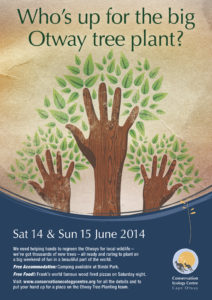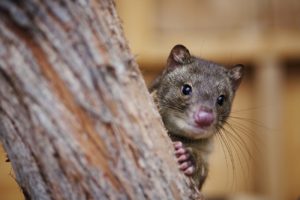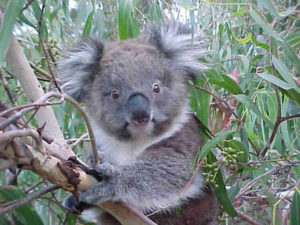Who’s up for the Big Otway Tree Plant?
 Join us on a special weekend, planting trees to restore the woodlands of Cape Otway.
Join us on a special weekend, planting trees to restore the woodlands of Cape Otway.
The little trees are growing and 14th and 15th June 2014 will see the biggest planting effort the Otways has ever known!
There’s free camping (thanks to Bimbi Park) and a pizza night starring Frank’s world famous wood fired pizzas, you’ll make new friends and the whole weekend will be lots of fun. We’d love you to join us!
Learn more about the Big Otway Tree Plant.
Download the poster here: The Big Otway Tree Plant
 We are delighted to announce the arrival of four beautiful, endangered Tiger Quoll joeys. The gorgeous spotted joeys are now three months old and fit into the palm of your hand.
We are delighted to announce the arrival of four beautiful, endangered Tiger Quoll joeys. The gorgeous spotted joeys are now three months old and fit into the palm of your hand.
Lizzie Corke, CEO of the Conservation Ecology Centre, says raising this many joeys in a first breeding season is unusual but the joeys are all healthy and their mother is caring for them beautifully. “They are growing fast and keeping snug and warm in the den,” she says. The joeys will help inform researchers about Tiger Quoll behaviour and assist with the conservation of these endangered animals. “These little quolls are helping to conserve their species” says Conservation Coordinator Dr Jack Pascoe.
Tiger Quolls are the largest remaining marsupial predators on the Australian mainland but their numbers are in serious decline. “By learning more about their behaviour we can improve detection techniques, which will play a vital role in the conservation of wild Tiger Quolls and the ecosystems they depend upon,” Dr Pascoe says.
Dr Pascoe says a captive breeding population is an important insurance policy for endangered species and, in time, these joeys will contribute to the long-term health of the captive population.
Wild Tiger Quolls were thought to have died out in the Otways for nearly 10 years until the recent discovery of scat (droppings) near Lorne and Cape Otway, which Ms Corke says has been an exciting and encouraging development.
The Conservation Ecology Centre is working on a number of projects to safeguard the future of Tiger Quolls, including training a team of community volunteers and their dogs to detect Tiger Quoll scats. Habitat restoration and fox reduction projects are also key activities of the program. You can get involved in this exciting project too! Make a donation to ensure the future of this special species, see our Conservation Experiences for voluntourism opportunities or become a volunteer.
Listen to the interview on ABC Radio National.
 Holidaymakers in the Otways have unknowingly collected the first evidence of endangered Tiger Quolls in the Otways for almost a decade. The scat has just been confirmed as that of a Tiger Quoll through DNA analysis by Dr Andrew Weeks at cesar, a research centre specialising in genetic analysis for wildlife conservation in Melbourne.
Holidaymakers in the Otways have unknowingly collected the first evidence of endangered Tiger Quolls in the Otways for almost a decade. The scat has just been confirmed as that of a Tiger Quoll through DNA analysis by Dr Andrew Weeks at cesar, a research centre specialising in genetic analysis for wildlife conservation in Melbourne.
Tiger Quolls are the largest marsupial carnivores remaining on the Australian mainland, and, as an apex predator, living at the top of the food chain, the species plays an important role in the ecosystem.
Already endangered, Tiger Quoll populations are declining across their entire range. Although the Otways has traditionally been a stronghold for the species, introduced predators such as foxes and cats have
combined with habitat destruction and fragmentation of populations resulting in dramatic declines over the last several decades and the species is now critically in danger of extinction in this region.
The great news unfolded recently when holidaymakers went to check a heavy thump on their back deck, and found a ‘spotted, ginger’ animal ‘a bit like a big possum’. The animal, which reminded the observers of a Tassie Devil, nonchalantly wandered across the deck, then stopped to drop a scat before jumping off.
Luckily the holidaymakers had the foresight to collect the scat and popped into the local Visitor Information Centre to ask about what they might have seen. The staff there gave them the contact details for the Conservation Ecology Centre (CEC) at Cape Otway.
With the support of their Patron, the Hon. Steve Bracks AC, the CEC is working to conserve Tiger Quolls across the Otways, working with government land management agencies and private landholders.
The Centre’s Co-Founder and CEO, Lizzie Corke, explains why these animals are a top priority for the Centre:
“Healthy and robust ecosystems are vital for the survival of us all and every species lost further jeopardises the ability of these ecosystems to bounce back. Because of their large home ranges and their position at the top of the food chain, efforts made to conserve the Tiger Quoll benefit a wide range of other species which depend on the habitats of the Otways. So much has been lost already that we need to make an urgent and concerted effort to care for what we have left.”
Acting Senior Biodiversity Officer at The Department of Sustainability and Environment, Saul Vermeeren, discusses the Otways quoll population:
“We don’t know how many quolls we still have living in the wilds of the Otways, or if they still constitute a genetically viable population. The confirmation that Quolls still exist in the region gives us the power to make informed planning
decisions on the management of public land. Hopefully by undertaking more intensive surveys and considering appropriate land management practices we will be able to generate positive outcomes for the species that will allow it to flourish in the wild.”
To understand more about the Tiger Quoll, DSE, Parks Victoria and the Conservation Ecology Centre are surveying for them using established techniques such as remote sensor cameras. The CEC is also developing a team of detection dogs, trained to search out Tiger Quoll scats. Tiger Quoll scats are then confirmed through DNA analyses.
“Scats contain DNA from the source animal, and we can therefore determine the species which left the scat using species specific DNA markers” Dr Andrew Weeks explains.
A key threat to Tiger Quolls is invasive predators, particularly foxes, and efforts to decrease fox numbers are vital for ensuring the future of Tiger Quolls in the Otways.
If you have seen a Tiger Quoll or are interested in getting involved with the program as a volunteer contact us.
Thanks to a Parks Victoria Healthy Parks Healthy People Community Grant, the Conservation Ecology Centre will be undertaking a survey of koalas and their habitats in 2012. We will be collecting information which will provide insights into the koala population and how their habitat has changed over the last 12 months, carrying out soil tests and habitat condition assessments.
Join us on:
Thursday 23rd, Friday 24th and Saturday 25th February
Thursday 8th, Friday 9th and Saturday 10th March
There will be a training session on the first day as a refresher and for any new team members. Contact us to let us know if you are interested in getting involved on any (or all!) of these dates.
Of course the surveys will be lots of fun with good food, good company and beautiful field sites!
